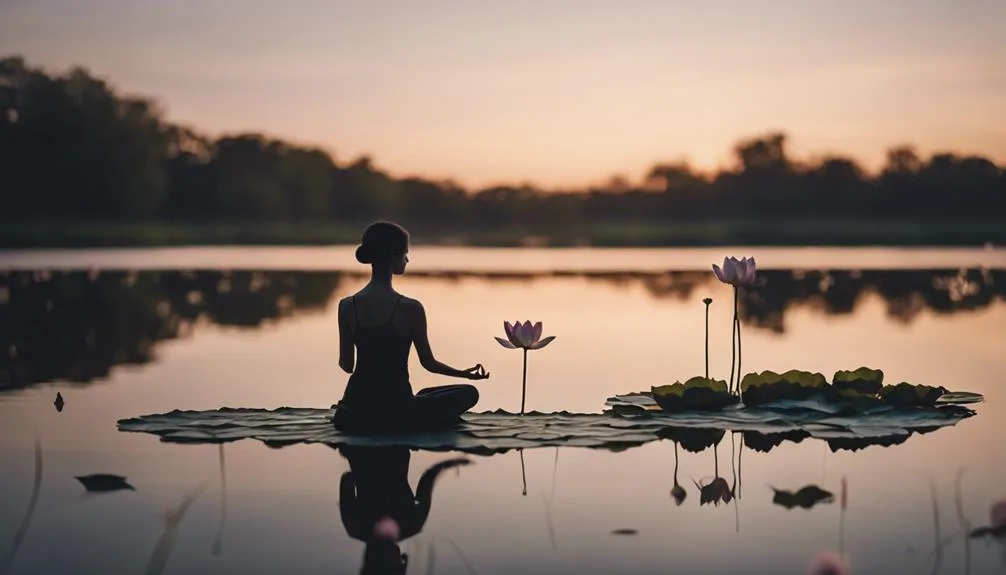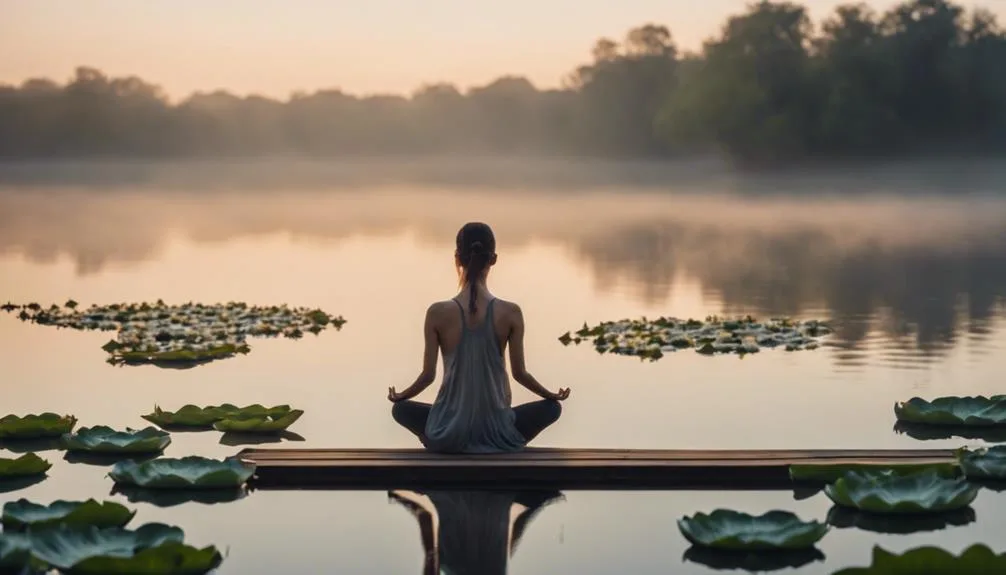Like a ship caught in a storm, we've found ourselves adrift in the tumultuous seas of overthinking, where peace seems as elusive as the horizon.
We've discovered, however, that meditation holds the compass that can guide us back to calm waters. It's not a quick fix but a journey towards understanding and mastering our minds.
In this discussion, we'll share insights and practical tips on how meditation can be your ally in silencing the noise and finding serenity. Let's explore together how this ancient practice can offer modern solutions to the age-old problem of overthinking, and why it's worth considering as a staple in your emotional well-being toolkit.
Key Takeaways
- Meditation reduces overthinking by creating space between thoughts and the thinker.
- Practicing mindfulness and meditation enhances emotional regulation and fosters self-compassion.
- Starting with just 10 minutes of daily meditation can significantly quiet negative thoughts.
- Acknowledging thoughts without judgment during meditation shifts the balance towards less thinking and more being.
Understanding Overthinking
Many of us have experienced how overthinking can trap us in a cycle of negative thoughts, distancing us from the present moment and our inner peace. This often stems from unhelpful cognitive patterns that spiral into inner turmoil, making it hard to break free.
We're not alone in this struggle; it's a common challenge that can deeply affect our mental health and overall well-being. Recognizing these patterns is the first step towards change. By understanding the roots of our overthinking, we can begin to address it constructively.
It's about shifting our focus from being caught up in endless loops of worry to finding strategies that help us manage these thoughts. Together, we can learn to navigate our minds more peacefully.
Meditation Benefits
Exploring the benefits of meditation, we find it's a powerful tool for alleviating the grip of overthinking, offering a path to greater mental clarity and emotional peace. Through regular practice, we've discovered:
- Meditation cultivates inner peace, quieting the constant chatter in our minds and fostering a serene mental landscape.
- It sharpens mental clarity, helping us to focus and make decisions with confidence, free from the fog of excessive thoughts.
- Self-awareness blooms, allowing us to recognize our thought patterns and emotional triggers, leading to healthier coping mechanisms.
- Lastly, meditation nurtures emotional balance, equipping us with the resilience to face life's ups and downs with grace.
We're here to support each other in this journey towards a more mindful and balanced life.
Mindfulness Techniques

Building on our understanding of meditation's benefits, let's now focus on specific mindfulness techniques that can further enhance our mental well-being. We all know how easy it's to get caught in the web of overthinking, but through mindful breathing, we can anchor ourselves back to the present moment. This simple yet powerful technique involves concentrating on our breath, which naturally calms the mind and reduces anxiety.
Similarly, thought observation allows us to detach from our thoughts rather than getting swept away by them. By observing our thoughts as if they were clouds passing in the sky, we learn not to judge ourselves based on the content of our thoughts.
Together, these practices guide us toward a more peaceful state of mind, helping us break free from the cycle of overthinking.
Emotional Self-Care
In our journey towards mental well-being, prioritizing emotional self-care is a crucial step in mitigating the effects of overthinking and nurturing a healthier mind. We've discovered that engaging in practices that foster self-awareness and self-compassion not only alleviates the burden of overthinking but also enriches our emotional landscape.
Here are key strategies:
- Acknowledging emotions without judgment, recognizing their transient nature.
- Practicing self-compassion, understanding that being gentle with ourselves enhances our resilience.
- Cultivating self-awareness to notice patterns that lead to overthinking.
- Seeking connection with others, sharing our experiences to realize we're not alone.
Gaining Wisdom

We often overlook how gaining wisdom through meditation not only soothes our minds but also deeply enriches our life's journey. Through the practice of sitting quietly and turning our focus inward, we embark on a profound path of self-discovery. This journey reveals insights and understandings that can't be found anywhere else. It's about wisdom cultivation, where we learn to navigate our lives with a deeper sense of clarity and purpose.
As we continue to meditate, we uncover layers of our being that were previously hidden. This process of uncovering and discovering aspects of ourselves is invaluable. It strengthens our connection to our inner wisdom, guiding us through life's challenges with grace. The journey towards wisdom is a cornerstone of our personal growth, enriching our experiences and relationships.
Acceptance Practices
Exploring acceptance practices, we'll find powerful techniques to embrace the present moment and let go of the struggle against what we can't change. This journey involves:
- Radical Acceptance: Acknowledging our reality without judgment facilitates letting go.
- Living in the Now: Focusing on the present moment helps in surrendering to what is, rather than what could be.
- Gratitude for the Present: Recognizing and appreciating what we've right now deepens our connection to life.
- Compassionate Release: Gently allowing our feelings and thoughts to flow without attachment encourages emotional freedom.
Through these steps, we cultivate a peaceful mind and heart, embracing life as it unfolds. Let's walk this path together, supporting each other in the gentle art of acceptance.
Meditation Routines

Establishing a daily meditation routine can significantly quiet our minds and ease the burden of overthinking. We understand that starting a new habit can be daunting, but we're here to support you on this journey.
Incorporating daily practice into our lives doesn't have to be overwhelming. Starting with just a few minutes of mindful breathing each day can make a profound difference. This simple act helps us become present, allowing thoughts to pass without getting entangled in them.
We encourage you to find a comfortable spot, set aside a specific time each day, and gently focus on your breath. This routine becomes a sanctuary, a time to connect with ourselves deeply, reducing the noise of overthinking.
Let's embrace this practice together, fostering a calm and centered mind.
Achieving Balance
Achieving balance in our lives requires a mindful approach to counteract the effects of overthinking. We all strive for finding peace and nurturing inner harmony, and meditation offers a pathway to achieving these goals. Here's how we can start:
- Identify Triggers: Recognize what leads us into overthinking spirals.
- Set Boundaries: Learn to say no to situations or thoughts that disturb our peace.
- Practice Gratitude: Focus on the positives in our lives to shift our mindset.
- Seek Support: Connect with others who understand and can provide guidance.
These steps aren't just actions; they're a commitment to ourselves to live more mindfully. By integrating them into our daily routine, we're not just finding relief from overthinking but are also stepping closer to a life filled with more peace and harmony.
Frequently Asked Questions
How Does One Differentiate Between Productive Thinking and Overthinking, Especially When It Comes to Making Important Life Decisions?
We often struggle to tell productive thinking from overthinking, especially during crucial decisions. It's about avoiding decision paralysis and learning to trust our intuition, recognizing when our thoughts help us or merely spiral unhelpfully.
Can Meditation Practices Vary Based on Individual Personality Types, and if So, How Can One Find the Most Suitable Meditation Technique for Themselves?
We've found that diving into personality assessments and experimenting with various techniques can guide us to our ideal meditation practice. It's about exploring paths until we discover what resonates, offering a supportive, enlightening journey.
Are There Any Immediate Physical Signs That Indicate One Is Overthinking, and How Can Meditation Help in Recognizing and Addressing These Signs?
We've noticed stress indicators like tension headaches and restlessness signal we're overthinking. Through meditation, we've learned relaxation techniques, helping us recognize and address these signs, fostering a supportive path towards emotional and physical well-being.
How Do External Factors Like Diet, Exercise, and Sleep Quality Affect One's Tendency to Overthink, and Can Meditation Influence These Factors Positively?
We've found that diet, exercise, and sleep quality deeply influence our overthinking. External factors like social media and environmental noise can amplify stress. Meditation can positively impact these areas, offering us a path to balance and peace.
We've noticed meditation can initially heighten thoughts or anxiety. To navigate this, incorporating guided imagery and focusing on breath helps. It's a phase; with persistence, we'll see benefits, feeling more centered and calm.
Conclusion
We've journeyed together through the labyrinth of overthinking, discovering the beacon of meditation. Like sailors guided by the North Star, we've learned to navigate the tumultuous seas of our minds.
Embracing mindfulness, self-care, wisdom, and acceptance, we're setting sail towards a horizon of balance and peace. Remember, every breath taken in meditation is a step closer to our serene haven.
Let's continue to anchor ourselves in the now, for in the art of being, we find our true liberation.

